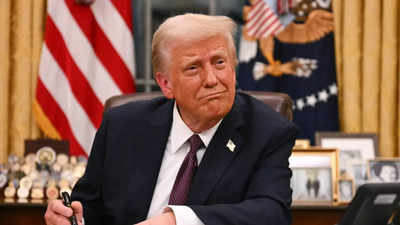7,000 Indian students overstayed their US visas in 2023: Trump’s immigration crackdown may make US dreams harder – The Times of India

President Donald Trump’s re-election in the United States has triggered a series of revisions in US foreign policy. As promised during his election rallies, the immigration situation in the US has rapidly evolved since his return to the White House. Jessica M. Vaughan from the Center for Immigration Studies, in her speech during a hearing titled “Restoring Immigration Enforcement in America,” reported that over 7,000 students and exchange visitors from India overstayed their visas in 2023. Vaughan also suggested several reforms in US immigration policies to address this issue.
She pointed out that in the same year, visitors from five countries had over 2,000 citizens overstaying their visas, with India leading the list, reports PTI. One of her suggestions to tackle the overstay problem was the removal of “dual intent” for student visa applicants. This would require applicants to clearly demonstrate their intent to return to their home country after completing their studies. Vaughan’s comments highlight the US government’s shift towards prioritizing domestic workers over foreign immigrants, signaling a new reality for students hoping for a future in the US after their education.
Proposed changes in immigration
The House Judiciary Subcommittee on Immigration Integrity, Security, and Enforcement held a hearing on January 22, 2025 titled ‘Restoring Immigration Enforcement in America’. The hearing was aimed at examining how the “Biden-Harris Administration dismantled immigration enforcement” and what the Trump administration can do to restore the system.
The hearing proposed several changes aimed at enforcing stricter rules for student visas. These changes could significantly impact the future plans of students who are currently in the US or are planning to pursue their academic journey there.
Stricter visa rules
One of the proposed changes is the elimination of “dual intent” for student visa applicants. Under this change, students would need to prove their intent to return to their home country after their studies, making it harder for them to stay in the US and build a career there.
Increased enforcement
Given the high overstay rates, especially from countries like India, there may be tighter monitoring and penalties for visa holders from specific countries. This could also lead to increased scrutiny and possibly more bias when approving visa applications from these countries.
Work visa changes
Significant changes are also proposed for the H-1B visas (for specialty workers). Vaughan recommended limiting the duration of H-1B visas to two years, with a potential extension up to four years. A cap on the total number of H-1B visas issued annually, set at 75,000—including those for the non-profit and research sectors—has been proposed. In case of oversubscription, the visas would be awarded to the highest-paying employers to ensure they go to the most skilled workers. These changes could drastically affect the US workforce and students who chose US education for better employment opportunities there.
Staffing companies
If approved, a ban on staffing companies sponsoring foreign workers could impact students looking for post-graduation jobs in certain sectors. Opportunities for such positions would likely become rare, and qualifications for those that remain would be more stringent.
US immigration policy in the long run
As changes in immigration policy under President Donald Trump continue to attract global attention, it can be speculated that future “harborers” of the American dream may need to look elsewhere for their aspirations. US foreign policy seems to be shifting towards an approach that prioritizes the interests of US citizens. The proposed policy changes suggest growing biases against immigration unless it significantly benefits the US. The world may soon witness a very different side of the United States, shaped by its new leader.
















